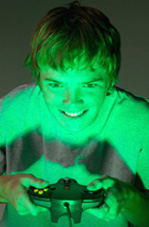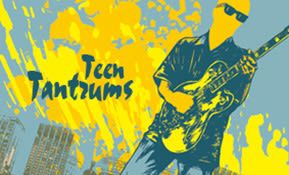At half past midnight, our 15-year old son, David, is typing feverishly at the computer. Though it’s a school night, it’s not homework David’s working on. What keeps him glued to the computer at this late hour is an online game. For over three hours, he’s been lying to us, saying he’ll be off “in a minute,” that he’ll do his homework. No matter what we do and say, and despite our hope that tonight is the night he’ll somehow miraculously change, we know he can’t get off the game.
 David’s an addict.
David’s an addict.The classic signs of addiction are all here: the lying, the lack of hygiene, the skipped meals (he doesn’t even think about eating until he’s pried off the online game) and the shirking of all responsibilities. He never studies. His grades have plummeted to almost all Fs. He also suffers from sleep deprivation, unable to get up in the morning or to participate in class.
When David’s not on the online game, he’s going through withdrawal. He’s anxious, bored, lonely and lacks motivation. He fantasizes about the game when he’s doing something else, and he believes the only thing that will make him feel better is returning to the game. What’s more, he tries to sleep the entire Shabbat so he won’t have to face the pain of withdrawal.
In short, he no longer functions as a normal child.
You might be thinking: Just pull the plug. Take the computer away—or at least the modem. Take control.
It’s not nearly as simple as you may think.
First, there are the suicide threats. When we merely threaten to take the computer away, David threatens to kill himself. The experts we’ve consulted all say we have to take these threats extremely seriously.
And then there’s the violence.
When David’s unplugged, he often makes life miserable for the entire family, especially when he attacks the other children. He’ll call them vicious names, pull their hair, kick them and destroy their games—anything to make them cry. It’s as though he wants to bring all of us down with him. Perhaps he wants us to share in the pain he’s feeling.
So to keep the rest of our family functioning, he’s back on the computer playing. And playing. And playing. David can be on the online game for up to nine hours a day on school days. And on Sundays, he can be on for up to 17 hours.
One time we couldn’t take it anymore, and we unplugged the computer while he was still gaming. He erupted. He let out a blood-curdling scream, acting as though someone just ripped his spleen out. He lunged at both of us, swinging and kicking. He was completely out of control. We had no choice but to call the police.
When the police arrived, a small crowd of neighbors gathered in front of our home. We felt the sharp sting of shame. And when the police entered our home, we felt even more shame. What David felt was fear. He thought the police were going to take him away. He wasn’t far from the truth. In similar cases, the police have hauled the child to the nearest psychiatric hospital. In our case, the police merely lectured David about honoring his parents and threatened to take him away next time if he doesn’t behave, thinking he’ll be scared straight.
He wasn’t. He was back on the game the next day.
David wasn’t always like this. He started out as a very bright child with decent grades. Then, when he was in elementary school, it suddenly became all the rage in his class to play a certain online game. We thought it was just a harmless game, something to blow off steam for a short while. And for most of the kids in his class, it was. But not for David.
The game he was playing, and is still playing all these years later, is a Massively Multiplayer Online Roleplaying Game (MMORPG) – just like World of Warcraft, Evercraft, Diablo and Runescape. According to Online Gamers Anonymous, these games are highly addictive because:
* They never end. You can never win; there’s always something more to be done.
* They provide a seemingly better world than the real, offline one. Here, you can have a thriving social life through groups or “guilds.” You can have many online friends (usually other addicts who care more about the game than anything else). And you can even be very wealthy and a leader of your guild.
* The more time you put into the game, the more successful you are (casual players trail far behind those who put in more time).
* They feature special, scheduled events in the game that require a large group of people—and that make players feel obligated to attend. These events can take anywhere from two to eight hours at a time.
With all these powerful traps before him, David quickly became enslaved by this MMORPG—along with many, many other children. And what makes matters worse is that these games, especially the one David’s addicted to, literally fill children’s heads with acts of murder and idol worship.
There seems to be no “natural” solution. Online game addiction is not recognized as a separate disorder by the American Psychiatric Association, which means treatment isn’t usually covered by insurance. The talk therapy of psychologists hasn’t helped; David’s on the game as soon as he comes home from the psychologist’s office. The pharmaceuticals of psychiatrists (who have treated his addiction as depression) haven’t helped either. Some experts say moderation is key. But for kids like David, there’s no such thing as moderation. Until David himself decides he’s had enough, there doesn’t seem to be any solution at all.
Except, of course, for prayer.
As Rabbi Natan, Rebbe Nachman’s main disciple used to say, where there’s deficiency, there’s either no prayer or lack of prayer. So we as parents need to strengthen our prayers and emuna that this, too, is from Hashem and for our very best. And along with our prayer that all the children in Klal Yisrael who are addicted to online games are soon cured of their addiction, it is our heartfelt prayer that other children and their parents should never suffer the pain and heartache we’re suffering.
Parents, do yourselves and your children a huge favor and know the enemy that’s constantly lurking in the shadows. Whether it’s a filter or a lock on your computer, do whatever you can to keep your children far away from online games. Or even better, don’t put a computer in your house in their first place. The difference between your healthy child and our David is a few clicks on the keyboard – that’s all.


 David’s an addict.
David’s an addict.






6/16/2021
You show unusually astute insight into what the video games really are, Eric7. Also, your idea of putting a "mezuzah" on your computer is spot-on.
To the author: This article broke my heart. I really wish you all complete liberation from this terrible yetzer hara. I faced motorcycle "addiction." It took a nearly fatal accident to break my son from it. Others suffer serious injury or even death. But a knowledgeable person pointed out to me how video game addiction is even worse. I agree.
10/30/2010
I was an adult into gaming. I used it to escape and cope with life for two years. What saved me was Hashem broke my computer.I was forced to live in this world.Thank you Hashem.I still dream about playing when my life is too stressful. I suggest treating it like any other addiction…the urge never goes away I know I have limit my computer time and a no games rule. Rabbi Twersky has some great 12 step books.
10/30/2010
Escaping Life
I was an adult into gaming. I used it to escape and cope with life for two years. What saved me was Hashem broke my computer.I was forced to live in this world.Thank you Hashem.I still dream about playing when my life is too stressful. I suggest treating it like any other addiction…the urge never goes away I know I have limit my computer time and a no games rule. Rabbi Twersky has some great 12 step books.